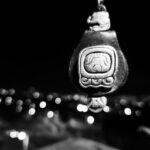Dear readers,
As you can guess from the title, this post is an alternative type of a jolly festive read. I’m sprinkling it all with a bit of jest and dark humour, which is the language I love best. That’s my first disclaimer. The second is that I’m not a qualified counsellor or psychologist, but God help my poor patients if I would ever decide to become one: their spiral might forever descend if their lives were put into my hands. The third disclaimer is that this post has no objective to obtain sympathy or empathy of any sort. I don’t need it. I write through personal experience, logging the journey and memories of mourning in order to support others who have also suffered a loss of some sort, whether it be a death or separation from a loved it, or anything that gives a sense of mourning or disappointment. It is also in dedication to my father, Stephen Arthur Rogers, who passed away on 9th October 2022. As romantic as it sounds, and I know he’s rolling his cynical eyes at me right now while I write these very words, but I feel he’s pushed me to write this. Or in any case, he’s certainly inspired it.
Over a year has passed. I haven’t written much publicly about my father other than expressions of grief on social media. I guess it might be that I’ve had too much to say or on my mind, and I didn’t have a blog or the correct medium to express it. I’m not in the business of drama dumping the world with my thoughts. Fuck no, I save that for my nearest and dearest. If we talk about the different stages of grief; by Jaysus, there are anywhere between 5 to 7 to a zillion steps to pass through depending on what and where you read it. On some level, I guess this post is my own way of coming to terms with it: the Acceptance stage. But what I write in the below paragraphs may contradict the last sentence. Because the process of grief is more complex than a step-by-step process.
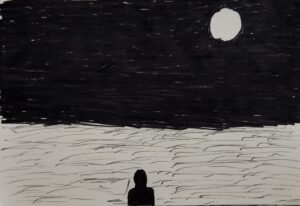
I knew a little something about the grieving process. Just before my father’s death, I was going through separation from my former partner. From that experience alone, I was going through tremendous loss, and as a way to find relief and emotionally and mentally prepare for the pending divorce, I read up on the grieving process to gain insight on what to expect and when. It’s not as though I was walking into it blindly; I’d heard of the 5 or 7 or however many stages there are of grief beforehand, but it all seemed simplistic and unrealistic. We all know, emotions are wretched to grasp, comprehend and control at the best of times. When a big life event comes along, it’s an emotional boxing match: blows all over the body, especially the head. The majority of the websites and self-help guides on grief have their disclaimers before launching into the “5 steps of horrendous mental suffering”, by stating that grieving is never linear, which is very good of them, but also wholly accurate. Grief isn’t linear whatsoever. But still, I felt it was lacking that je ne sais pas quoi.
As mentioned above, my father passed away on 9th October. He battled a short but intense fight against lung cancer. I remember in the weeks after the initial diagnosis in early August, I was learning all these terms and what they meant, like CT scans and the use of different dyes and colouring. I learned this-or-that scan may impact if Dad could receive chemotherapy, or that the effects of this-or-that treatment may make dad more poorly for a day or two. There were different types of diagnosis which I never knew existed, and then there was the dreaded term nobody wants to hear about themselves or a loved one: palliative care – end of life. There were different types of nurses and hospital units and treatments flowing through the conversations, and consequences and ifs-and-buts if this-or-that happens: it confused me more, as well as being the worst dictionary exercise ever. My brother and sister were grand, talking me through everything in layman’s terms. They are professional doctors and have witnessed some of this in their day-to-day jobs. It couldn’t have been easy for them having to regurgitate the spiralling bad news and information from the doctors’ technical jargon into words that the rest of the family could comprehend. That comes with its own traumas. Something I will always be grateful to them for.
This was all happening during a British autumn. I was not used to the wind and drizzle and greyness, being that these days I am very much a tropical animal, thriving on vitamin D and rays del sol. Still today, in Honduras, on the rare day when temperatures drop and there’s a little drizzle, it evokes something of a melancholic trauma of those final weeks. The dampness and rain and clouds and sitting in cafes at the Royal Worcestershire Hospital drinking shitty coffee waiting for shitty news; I fucking hate those memories with a passion. It still sits in my system rather uncomfortably.
I remember the first pangs of grief hit me some weeks before my dad even passed. I sat down for a pint with my best mate Stuart Harbourne in a bar in Birmingham, and he kind of confirmed what I already knew, “Lung cancer: it’s one of the bad ones”. It causes a little sense of guilt in my low moments, that I somehow premeditated or manifested the worst-case scenario. What might have happened if I’d used the power of positive thinking? Would things have turned out differently? Silly, really, I know. Very irrational and absurd. The devil’s work, procrastinating such things. I’m able to rationalise it; don’t worry. After all, I’m not sure how positive-thinking medically prevents the spread of aggressive cancerous cells. But there you go.
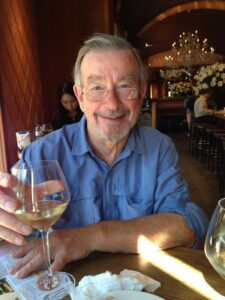 Back to the day that my father died, I had returned to the house in Malvern after spending the night at the Royal Worcestershire Hospital at his bedside. His last few hours were traumatic for reasons I won’t go into here, although I told my father dad jokes which I found on Twitter (my friend presses all the buttons in an elevator. It’s wrong on so many levels) to which he either raised a smile or rolled his eyes amongst the tubes and wires and beeps from the surrounding machines. I remember him taking off the oxygen mask. That was symbolic. I can’t remember the hour it happened, but it happened nonetheless.
Back to the day that my father died, I had returned to the house in Malvern after spending the night at the Royal Worcestershire Hospital at his bedside. His last few hours were traumatic for reasons I won’t go into here, although I told my father dad jokes which I found on Twitter (my friend presses all the buttons in an elevator. It’s wrong on so many levels) to which he either raised a smile or rolled his eyes amongst the tubes and wires and beeps from the surrounding machines. I remember him taking off the oxygen mask. That was symbolic. I can’t remember the hour it happened, but it happened nonetheless.
“Enough,” he said.
We played his favourite music and we comforted him from the wee hours to midday. As stated, I went back to the house with my sister-in-law to collect some things but I can’t quite remember what things we had to collect. My sister-in-law did the collecting while I roamed the house in a stupor. It was then I received a phone call from my brother confirming my father’s death. A few tears rolled down my cheeks. There was a sense of relief too, that my father was no longer in pain.
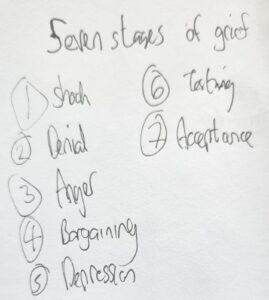 En-route to the hospital, I spoke to my sister-in-law about how I’d been reading up on the different stages of grief, but the whole process wasn’t really speaking to me. Shock. Denial. Anger. Bargaining. Depression. Testing. Acceptance. Fuck me, they read like seven deadly sins. The most terrifying seven dwarfs to ever exist. Was I really seriously supposed to get through all these levels, like a feckin’ XBox game? It confused me, especially the Acceptance stage. In the following months of mourning, every eejit in the world who had ever felt anything in realms of mourning kept telling me “you never get over it…it just gets easier.” Do we never quite accept it then? Does mourning last a lifetime? Fuck that. When I looked down the list of the seven deadly stages of grief, I couldn’t find what I was feeling at that very moment: Numbness. It was like a big metal wall from all emotion. Just nada. Is this Denial then, or a symptom of Shock?
En-route to the hospital, I spoke to my sister-in-law about how I’d been reading up on the different stages of grief, but the whole process wasn’t really speaking to me. Shock. Denial. Anger. Bargaining. Depression. Testing. Acceptance. Fuck me, they read like seven deadly sins. The most terrifying seven dwarfs to ever exist. Was I really seriously supposed to get through all these levels, like a feckin’ XBox game? It confused me, especially the Acceptance stage. In the following months of mourning, every eejit in the world who had ever felt anything in realms of mourning kept telling me “you never get over it…it just gets easier.” Do we never quite accept it then? Does mourning last a lifetime? Fuck that. When I looked down the list of the seven deadly stages of grief, I couldn’t find what I was feeling at that very moment: Numbness. It was like a big metal wall from all emotion. Just nada. Is this Denial then, or a symptom of Shock?
My sister-in-law nodded in agreement. She understood the confusion, noting that the different stages had become a little antiquated. She then pointed me in the direction of something called “the ball and the box”, and this became a game-changer, not just for the mourning, but having a golden nugget to handle emotions and understand why I might be feeling something at any given time. I guess it’s in the area of mindfulness or NLP (Neuro Linguistic Programming), registering what we’re feeling and making sense of it in a collected manner. It is the finest piece of advice to hear in the absolute immediate aftermath of such a monumental moment in my life…the loss of a parent. Kind of an angelic moment, if we have to be spiritual about it. I’m so grateful to her, and that moment.
“The Ball and the Box” Analogy
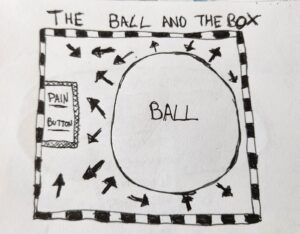
Grief varies from person to person and situation to situation. Sometimes it is more intense for some or to a situation, due to the emotional attachment that we have to it. When we pass through something, intense emotional pangs can resurface, rocking us when we least expect it. The analogy ball likens grief as a box with a ball and a pain button; in the early stages, the sizable ball incessantly triggers pain. Over time, the ball diminishes, though its impact on the pain button remains intense. This analogy provides a way to express daily emotions, describing the fluctuating size of the ball and acknowledging the ongoing process of coping.
I changed it up a bit. Instead of the ball decreasing in size over time, I saw it similar to a pinball machine or the 70s or 80s computer game “stack attack”, where the ball constantly moves and bounces off the sides, which would slow down over time. Each bounce would represent an emotion, a stage in the grieving process or even a certain behaviour, such as struggling to get out of bed or the aforementioned numbness, or just acute stress. I would label it and accept it, and record it in a journal or do a doodle or drawing. In the first few weeks, the influx of emotions might mean I’d feel five or six different things in one morning, let alone a day. I might burst into tears over hearing a particular song at 8am, but then laugh like a loony over a certain memory at 9:30. It’s just the way it was.
Nonetheless, it is a coping mechanism that I still turn to today to manage other things going on in my life. I even have my own name for it, which bears the name of this blog post. The Game of Grief aka Grief Ball. Rules of the game: try to experience as much melancholy in the space of 24 hours as possible. You might be left a nervous wreck, but, hey, what doesn’t break you… ignore me.
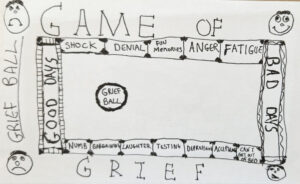
Having made cheek of the websites talking about the different stages of grief, I don’t think I should go any further without including at least one link to website that explains the process in more detail. As stated above, I am not a psychologist. A website like this maybe something you need. This one is from Medical News Today, chosen pretty much at random.
Other Coping Mechanisms
I mentioned journaling in the previous paragraphs. This I was doing everyday anyway, being a keen writer. I find it very cathartic, my favourite way of expressing myself. It’s just that the daily journals became longer and more intense. I also attempted to write how my mum and dad first met, which is a fascinating novel in itself. It is a project I have postponed for the time being, as I just didn’t have the mental capacity to manage it at the time, but one that I will return to one day.
I took up drawing a daily doodle or drawing: art therapy. A joyful pastime and self-taught skill that I no doubt inherited from my mother, a habit I continue to this day and I hope many more days beyond, and something you will see more of in my next and future posts.
We listened to a lot of music as a family: all my dad’s favourites, which we would listen to on car journeys throughout our childhood. The Travelling Wilburys. Dire Straights. Fleetwood Mac. Carole King. Sharen Clark. Bob Dylan. Amongst others of course. The Rogers siblings gifted our mother with a record player that Christmas so she could play her many vintage vinyals, something we would do late into the evenings over a few glasses of Famous Grouse or wine and a few tons of Cadburys chocolate.
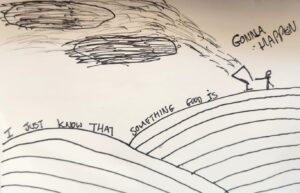
I was also hooked on the song Cloudbusting by Kate Bush. I am unsure why. It wasn’t a favourite of my father’s. I remember my mum dancing around the kitchen to it when I was small. The hills where the video is made looks very simlar to the Malvern Hills, close to where I was residing at the time. I guess the imagery just resonated. But there are lyrics in the song that remind me of dad, as well as the book which the song is based on, A Book of Dreams by Peter Reich. This will also feature in a future blog post.
Two other songs I have listened to a lot in the past year are written by the same artist, Noel Gallagher. They are Stop Crying Your Heart Out, during his time with Oasis, and Dead to the World, released in the early months of 2023. To those who don’t know me well, I have an obsession with Noel, almost bordering on unhealthy, and this will no doubt be revealed in future posts. Nonetheless, the lyrics and nature of the songs resonated with me. A friend also sent me a t-shirt, based on Stop Crying Your Heart Out, which became and still is something of a security blanket, and you can see it below.
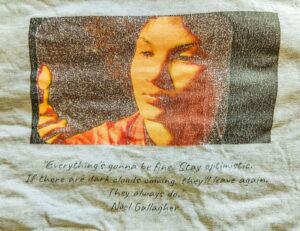
Another song I played a lot was a Spotify find, but it certainly helped both with the death and the separation. It’s called Let Go by Girls of the Internet. Have a listen. The lyrics will help you understand why it’s a personal song.
Books. Of course, there were books. I’m a reader as much as a writer. One book I read is highlighted above, A Book of Dreams by Peter Reich, but there was also Everyday Madness: On Grief, Anger, Loss and Love by Lisa Appignanesi and Grief Day by Day: Simple Practices & Daily Guidance for Living with Loss by Jan Warner. They helped to varying degrees and resonated with me to a point, providing hints and strategies to cope, but then they became a bit emotionally exhausting. I tried to dig into It’s OK to Not Be OK by Megan Devine in the early months of 2023, but by then I’d had my fill of self-help literature and I needed to read something else.
I received therapy. It helped at certain moments, especially advice on what to do when anniversaries and birthdays of my father came up. Instead of feeling sad, make a cake and celebrate the day, for example. I can’t say it was amazing for the grieving of the death of my father, but in the aftermath of the divorce, it was grand (and cost about as much, as well). Joking aside, it helped to an extent. I had reiki therapy as well, something that helps me spiritually. If you are by any chance in the Malvern area in the UK and in the need of deep chakra cleansing, contact Jayne Blatchford.
Human Touch: Everything Connects
Apart from A Game of Grief and “the ball and box analogy“, friendship and family were the biggest support. Despite my friendly demeanour, I am very much an introvert, so opening myself up is not as easy as one might think. It’s very habitual for me to spend time alone and isolate myself, which is fine. I enjoy it and need it. The whole grieving experience, however, has forced me to come out of my shell and seek support. Not just from my nearest and dearest, but from people who have entered or re-entered my life in the past year, and also colleagues, who have given me a tender loving hand when I didn’t realise I really needed it. I am very much a different person to how I was before. I almost don’t recognise myself, kind of new shed of skin or a refill of a different blood type or something. I feel stronger, wiser, more durable, I take greater care of my mental and physical health, and above all, being more empathic, all thanks to friends and family.
 From the moment my father was even diagnosed with cancer, the love and support from friends and colleagues was incredible. My dad touched many people and did things with his life I had no clue about.
From the moment my father was even diagnosed with cancer, the love and support from friends and colleagues was incredible. My dad touched many people and did things with his life I had no clue about.
I remember my NPH Communications colleagues purchasing a Honduran shirt for my dad in his final days. My boss gave me as much time as I needed to get myself together, and colleagues in Mexico, some of whom had lost their own fathers of late, sent me loving advice and encouraged me to give myself time rather than rushing back into “la chamba”.
I remember how my university friends, Jordan Kenny and Matthew Armitage came to my dad’s memorial, having travelled some distance where they heard me use the f-word three times in a joint speech with my siblings in a room of 200 or more friends and family. Matthew almost left me crying with laughter on the hard-wooden floor of the Bluebell pub the night before the memorial. Despite me telling him there was a perfectly good Bed and Breakfast up the road from my mother’s home, he chose an abode on the other side of the Malvern Hills that served food through a feckin’ trap door and was full of goats and sheep. I have been to and experienced a few far-out things on misadventures, but this was on my feckin’ door step. He told me he thought he was going to be murdered, and I thought so too but I also thought I was going to die first from cardiac arrest – muerte de risa – death by laughter. Murder in the Malverns, which you have to say is the perfect title for the shittest crime novella you’ve never read.
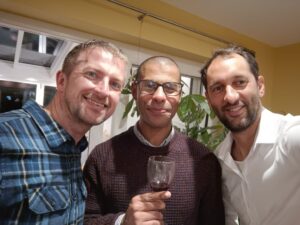
The aforementioned Stuart Harbourne was also a great support. A man who lost his own father just a few years ago, he would take me down to Solihull Moors where we’d eat overpriced hamburgers and drink copious amounts of beer, while using intense dark humour to see light of the situation. Weeks before dad died and I was reeling from the separation, Stuart smashed through walls to bring a good few chuckles to the day, a distraction I deeply needed, on a boozy day out in Birmingham. Stuart’s humour has very few limits which makes us kindred spirits of a sort, as I have a similar view on life. As Dave Chapelle says, “Everything is funny, until it happens to you.” Stuart loved my dad’s dry wit, and felt inspired by it. One particular story he loved about my dad was when I was just about to come to the UK and we were speaking online.
“So what do you want to do when you’re back?” he asks.
“To relax, dad. I’m exhausted. Maybe go to a health spa or a swimming pool. Like we did every Sunday when we were kids. Do you remember, dad, at the university? It was great fun. Wonderful memories,” I say.
“I fucking hated it,” he replies.
That was dad. A hilarious crusher of childhood memories, but a man who would sacrifice his Sunday mornings so we would enjoy a swim.
There was also Niku Mehta, who supported me through the grieving process, and still does today, using her own experiences of losing her mother and the phrases of loss she went through, and the spirituality she learnt along the way. I felt a little bad for chickening out of getting a tattoo from her niece. No doubt, that day (or tattoo) will come.
There might be others in the UK who I have failed to mention. Please don’t consider yourself less important. It’s just that this blog post is turning into something of a dense Russian novel. For SEO, it’s grand. For people’s short attention spans, it’s a feckin’ nightmare.
On the Latin American side, thanks to the ever-flowing cariño that glows in the bloodstream of these people, especially Hondurans, they have made the mourning so much easier. Back in February of 2023, after spending five or six months in the UK, I was nervous about returning to the country, especially leaving my family, but also confronting the unknowns of the divorce. I was able to get into my stride pretty quickly though, due to the friendships and love I have developed here. Obviously, being 7,000 or more miles away from my biological family is not easy when emotions are so raw in the grieving process. God knows what I would have done 30 or 40 years ago without the joys (and distractions) of the internet and WhatsApp. It ensures we’re never out of sight or mind on a daily basis, and a Sunday morning call, usually with me with a hangover, just to keep my mother at wits end. Obviously, the energy you get from a hug or being around family members when they need it or when I need it is a constraint, and I am still waiting for Elon Musk to pull his feckin’ finger out and invest in travel vortex that enables people to step through a door rather than sit on a plane for 12 hours and add to holes in the ozone layer while being charged thousands of pounds.
One must understand that the grieving process between Honduras and the UK might well be different, especially immediately after someone passes away. In Honduras, the person is usually buried the next day or the day after that. In the UK, it might be two or three weeks later, maybe more if the corpse requires an autopsy. It does make a difference to the pain that one feels, but I always find it sad that people have to rush to organise everything and, rather sadly I feel, say their final goodbyes in a traumatised state. Maybe that’s the best way to do it rather than wait around for weeks. I asked a friend about this, and she replied with a shrug, saying, “It’s just the way it is.” I won’t go into the reasons for these cultural differences, or whether it’s the same in other Latin American cultures. Nonetheless, it’s a point I felt I needed to make.
My Honduran family isn’t a replacement for my biological one. Of course not. However, they are in fact a huge privilege who keep an eye on me when things are great, or not so. It makes it so difficult to tear myself away from the country, a place with so much natural beauty but it still doesn’t surpass the beauty of the people. It’s a magnetic pull. I feel part of the furniture. For me to leave would be like smashing the family rocking chair. It’s painful.
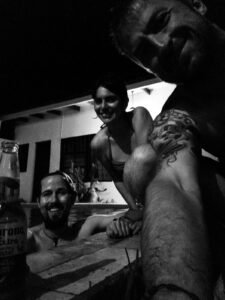
Mariela Vega and Nacho Huerta are prime examples. From the moment since I re-landed on these shores, they have been in constant contact, advising me to not rush into decisions when my train of thought was somewhat irrational and I was cooking up rash ideas. I sometimes consider them my surrogate siblings, keeping me steady when things are not so. They have been close friends for many moons, ever since I arrived in Honduras in 2011, as well as housemates at various points. Mariela always remembers how my father at my wedding thanked her and Nacho for looking after me. Then on the first anniversary of my father’s death in October, we shared a tipple of one of my father’s favourite rums, a 23-year-old Ron Zacapa, a luxurious liquor from Honduras’s neighbour, Guatemala. They have opened my horizons and introduced me to fascinating people down the years, opening up new circles of friends, which I always appreciate.
In March of 2023, someone entered my life in the most unexpected way. Her name is Uris Cruz. It’s fair to say that we were both going through a challenging period when we met; she too was going through her own grieving process and was finding herself again. We met at an inipi ceremony, which I never knew existed until my friend Alexis invited me. It certainly helped me sweat out and purge some physical and mental toxins, while also turning my vital organs to ash in the process. From there, we quickly formed a formidable and natural connection. She is quite a bit younger than myself, but it doesn’t matter; it has opened my mind, teaching me that we can learn a lot from someone from any walk of life, who is younger, a different generation and/or culture. One might expect the older head to be the wiser, but at times, I feel the roles somewhat reversed, as I continue to learn from her. We already have a lot in common, in terms of enjoying similar movies, TV series, music, literature, and art. I am guilty of falling asleep during movies. She keeps presenting me with little movie or musical gems from time to time, and the way she talks about the clothes, make-up, movie sets, use of music and sound, narratives and scripts, it leads me to believe that she should seriously consider a career in film production. She possesses an acute and passionate eye for detail and style that she really should explore. Also, I actually think she knows more about what is happening in the British media and music scene than I do. She keeps sending me links to things and I’m like, “HOW DID YOU KNOW THIS?” She’s quite an anglophile, aside from the evils of British politics and its dark history, which she enjoys reminding me of now and then.
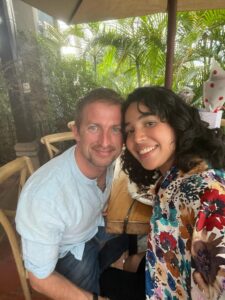
Uris is an extraordinarily pretty girl, but she has given priceless gifts during our close friendship that I feel eternally grateful for and inspired, in ways which she may not realise. At the time we met, I wasn’t eating well nor doing much exercise. She noticed these things and told me off for it, a sharp slap on the wrist San Pedro Sula style. She also noted that I wasn’t looking after my skin, so she advised me on cremes and ways to take better care of my hygiene. She compliments me on my attire and recommends fashion tips and thrifting in retro stores, which has boosted my confidence and impacted me in such a positive way. She’s also inspired me to explore my creative side, laugh at myself a lot and go out and meet new people: enjoy the spice of Latin American life once again. Today, I ensure that I have three healthy meals a day, I go to the gym daily, my skin is glowing like a feckin’ 5 year old, I feel the best that I have in years both physically and mentally, and they have been key building blocks that has made me a stronger person with a lot more self-love. It’s like an injection of GenZ into my “you’re such a boomer” bloodstream, something that has kickstarted my life and I feel excited by myself again.
As mentioned above, I am eternally grateful for these gifts. I hope I’ve been able to do the same for her. I was so proud when she graduated from university, she overcame some anxieties and travelled to Europe by herself, and I am pleased to see her pursuing her love of photography, building her confidence and talent to fulfil her own creative goals. Whichever avenue she goes in life, I wish her the best and she has my backing. She has all the ingredients to make a success of herself. By the way, she also gave me a kick up the arse to get this blog going again, so if you love it, thank her. If you hate it, blame her.
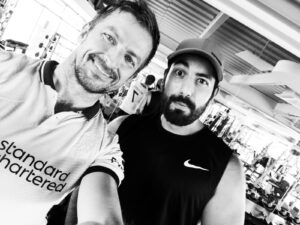
Another group of people who have really come into my life and supported me in the past year is the Kafie family. Richard is my colleague, friend and gym troll, while also helping this blog to life. Similarly to Uris, I have learned a lot from someone much younger than me, especially marketing and the use of AI, someone who pushes me to extend my knowledge in leadership, technology and healthy living. Age should not be a boundary of where learning should derive from. His dark humour and terrible puns leave me in stitches, and I appreciate the constant lifts, like so from his sister Annette who has been a wonderful friend, lawyer and confidant, whether it be divorce, immigration, relationships, careers, grief, and butterflies. Yes, butterflies. She hates them. She has a phobia. It’s called lepidopterophobia. I have never met anyone with this condition, which I find hilarious, and also has a little bit of magic realism about it. If a moth delicately flaps into a room, Annette violently bolts it out the door. My goal is to help her confront this absurd fear and lock her in a butterfly farm. All joking aside, she is a close friend who is one in a million, which is about the same ratio of people with lepidopterophobia. She has opened up a door of new friends and acquaintances that I much appreciate, yet she loses me friends by calling me by my middle name in public. Like I do for her parents, who invite to their home for 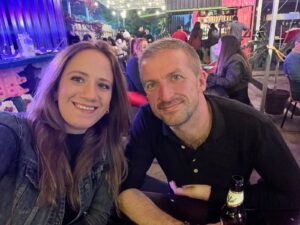 family events and parties. Her father is a doctor and firework expert, which is a good job in case of a worst case scenario, and his talents were on display as he set the garden alight with rockets and crackers on Christmas Eve. He also told me the key ingredients in how to make a bomb, which might come in handy if my career takes a change of direction. The family has played a role in helping me settle down after a turbulent period. It’s unconditional love: a beautiful friendship.
family events and parties. Her father is a doctor and firework expert, which is a good job in case of a worst case scenario, and his talents were on display as he set the garden alight with rockets and crackers on Christmas Eve. He also told me the key ingredients in how to make a bomb, which might come in handy if my career takes a change of direction. The family has played a role in helping me settle down after a turbulent period. It’s unconditional love: a beautiful friendship.
I also mention Francisco Jimenez and Enrique Guerrero, who have also lost their fathers over the years, and we often, rather darkly, call ourselves bastards. That is our sense of humour, which is often silly and teenage-like, despite the three of us being over 40. One has to make light of such situations. Their advice and company have been a positive, if sometimes adolescent, distraction.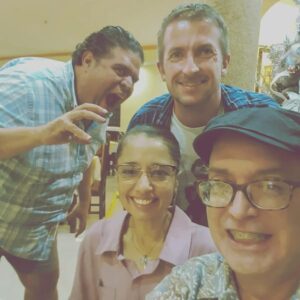
Lizandro Saenz, my housemate, has been quite extraordinary. He has been extremely patient with me while I absent-mindedly done my all to destroy his apartment one way or the other, from blowing up his microwave to leaving burn and ring marks on his work surfaces and tables, smashing tupperware and glasses as though it were a Greek party, losing my keys on multiple occasions, and generally being a bit messy – I have lost quite a few of my nine lives. I have been on a hot run of being clumsy, and I’m legitimately petrified to go anywhere near the stove’s gas canister as I might turn the condos we live in into a mass grave. All dark jokes aside, he has listened to me talk about my father’s passing and the separation from my former partner, who he is also close friends with, and provided very sage and empathetic advice. Neither of us knew I would be staying in the apartment quite as long as long as I have, but his friendship has been a vital stepping stone, something I am and will always be very grateful for.
For this reason, I have found friendship and human connection indispensable throughout the past year. It is not that you have to tell everyone of your loss. Usually the only thing a person can say is, “I’m very sorry” or “Lo siento mucho.” It is fine. It is enough. Sufficient. Sometimes you don’t need to hear more and they don’t need to say more. Sometimes people are less empathetic and you deal with that too. It’s part of the grieving process. Sometimes you don’t want to think more about it, and a distraction in the company of friends is the tonic. If you struggle to make friends or are introverted like myself, see a counsellor. Try not to isolate yourself. Human chemistry is a wonderful medicine. It doesn’t cure the loss, but it’s a cathartic release.
Final words
I often get called nice and kind. It’s nice to hear, obviously. Anyone would like it. I guess the majority us strive to be that way. Do the right thing, so to speak. Key adjectives to describe a good person. I don’t want to give myself too much of a pat on the back or give myself a Jesus complex, of all times at Christmas; that’s just cringe. Nice and kind aren’t the first adjectives that come to mind when describing myself, anyway; I feel I’m made up of a whole heap of adjectives, some pleasant, some less so, which is pretty much the same for all of us. I don’t think I’m being hard or soft on myself or downplaying myself: it’s just the way I see life. I think I’m a good person, don’t get me wrong, but I think most people are.
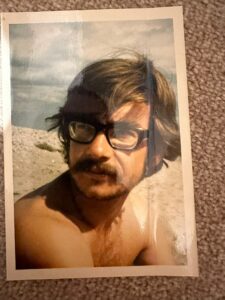
Nice and kind aren’t intrinsic qualities for me. They are more states of behaviour that I have been learned, witnessed and modelled for me. A formation or education, so to speak, instilled by dad. They are the greatest inheritances he left me. To treat people well. To pay the favour forward if you have been treated well. Kind of passing on the good karma or energy or whatever you need to call it. I definitely haven’t always been that way. I’ve just learned from the best.
My dad was a selfless man. He had a difficult upbringing with quite a lot of insecurity, which sometimes manifested in his character. Some men might have fallen; he carried on. But he was selfless. He never complained about it. It was what it was and he did his everything and sacrificed so much of himself to give my siblings and myself the best upbringing he could. Education, camping holidays, swimming on Sundays, wonderful gifts at Christmas and birthdays, strong values, and a whole lot more. And by Jaysus, did he do a grand job. My brother is a psychologist, my sister a doctor and me a journalist. We’re all in leadership positions in organisations or companies in the caring sector and make a difference to the social fabric of society or the communities we live in. We’re all happy and succeeding, armed with ambition and intelligence, and for myself, devilishly good looks. My siblings, less so. Joking aside, we inherited it from him. He laid it out for us and it feels like we are magnetically drawn to it. Like the puppeteer, leading us to do good. He taught us this, but consciously and subconsciously, through as I said, modelled behaviour.
I kind of laugh to myself. In the months before my dad died, my brother had a great job change and became an honorary lecturer at a university, my sister had a beautiful baby and I had a promotion. He saw this and thought, “Fuck it, I’ve done my job. It’s time for me to clock off. It’s yours to fuck up.” But at the parting glass, I know we left him proud.
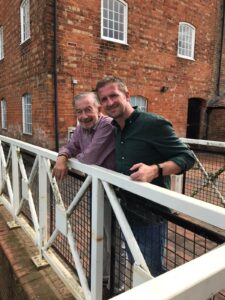
He did it all with an ounce of tough love. We needed it. I did, for sure. I was a lazy little eejit in my youth, either up to no good or nothing at all most of the time. We rowed and fought and argued, and I used to hate that I knew that he was mostly always right. But he would always put that all important arm around me when I needed it, after heartbreak or a disappointment. He used to say it was all part of the process. He always taught me to not settle for certain jobs or positions, that is good to have ambition, but to fucking well work for it. He dragged me away from the edge on multiple occasions, pressed my buttons, pushed me out of my comfort zone and gave me important guidance, which I hated at the time, but he did it with a pinch of humour that now makes me laugh. When I told him I was interested in studying philosophy at university, he replied, “To be what? A thinker? Think again, son.”
I used to get annoyed when mum used to say, “You and your dad are so similar”. I don’t know why. I think it was to rebel against control. But now I see it and I feel robust and proud to have some of his traits. At his funeral, I read out a speech near his resting place. I remember a slight breeze kept swiping the paper from my hand, and I made a joke of it, something along the lines of, “Fuck it, not now, dad.” I kind of regret that I misplaced the paper that I wrote the speech on. I wanted to keep it for sentimental value. I remember saying he had no time for the frivolous. Seriously, it’s true. I’ve never met anyone with such an accurate bullshit detector in all my life. Apart from that, I can’t remember much else I said. Maybe that’s okay. Maybe I should consider them just that: final words.

To conclude, yes, I guess I’m at the Acceptance stage. It doesn’t mean I don’t miss dad. That continues. It’s just that in the Game of Grief, the ball rolls slowly now. The triggers are less and come a little unexpectedly. But that’s okay. It’s part of the acceptance, I suppose. I now have a stronger base in life and manifest new goals. I am happy. May the law of attraction bring me good fortune.
The real objective of this post is to provide others with advice on the grieving process, let you know what has worked for me, so you can arrive at a place of peace.
I hope it has done so for you.

